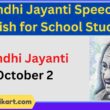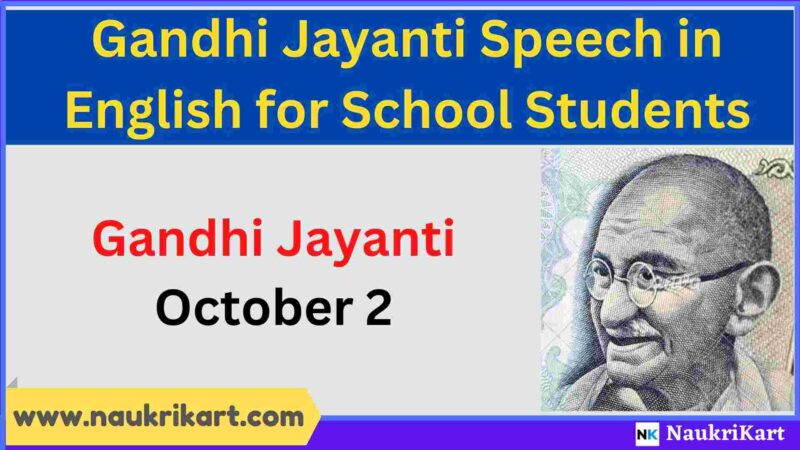Gandhi Jayanti, celebrated on October 2nd every year, marks the birth anniversary of the Father of the Nation, Mahatma Gandhi. This day is not just a national holiday but a time to reflect on the principles and values that Gandhiji stood for. To commemorate this important occasion, we will present three different speeches suitable for school students – a 10-line speech, a short speech, and a long speech – each providing a unique perspective on Mahatma Gandhi’s life and teachings.
Gandhi Jayanti Speech in English (10 lines):
Ladies and gentlemen, teachers, and my dear fellow students, Gandhi Jayanti is a day to remember the indomitable spirit of Mahatma Gandhi. In just 10 lines, let’s revisit his enduring legacy.
- Gandhi Jayanti is a tribute to Mahatma Gandhi’s legacy, highlighting his unwavering commitment to truth, non-violence, and social justice.
- Gandhiji’s famous quote, “Be the change you wish to see in the world,” inspires us to take personal responsibility for positive change.
- He led India’s freedom movement through non-violent civil disobedience, showcasing the immense power of peaceful protest.
- The spinning wheel, or “charkha,” symbolized self-sufficiency and economic independence, concepts that remain relevant today.
- His philosophy of “Satyagraha” taught us the strength of truth and moral courage as tools for transformation.
- Gandhi’s life was a testament to simplicity and humility, reminding us of the importance of living a purpose-driven life.
- On this Gandhi Jayanti, let us recommit ourselves to the ideals of truth, non-violence, and equality, striving for a more harmonious world.
- His advocacy for communal harmony and religious tolerance continues to resonate, promoting unity among diverse communities.
- Gandhi’s legacy extends beyond borders, serving as an inspiration for countless movements and leaders worldwide.
- As we observe Gandhi Jayanti, let us honor the Mahatma by embodying his principles and working towards a more compassionate and just society.
Short Speech on Gandhi Jayanti for students:
Honorable teachers, respected guests, and my dear friends, on this auspicious day of Gandhi Jayanti, let us delve deeper into the life and principles of Mahatma Gandhi.
Mahatma Gandhi, born on October 2, 1869, in Porbandar, was a beacon of hope for a nation under colonial rule. His life’s mission was to secure India’s independence, not through violence, but through the power of truth and non-violence.
Gandhiji’s philosophy of “Satyagraha” or truth-force urged us to resist injustice and tyranny without resorting to violence. He proved that even the mightiest empires could be defeated with the strength of conviction and non-cooperation.
One of the most iconic images associated with him is the spinning wheel or “charkha.” It symbolized self-sufficiency and economic independence, reminding us of the importance of self-reliance.
Gandhi’s principles extended beyond politics. He was a staunch advocate of communal harmony, religious tolerance, and the upliftment of the downtrodden. His life was a living example of simplicity, humility, and austerity.
In conclusion, on this Gandhi Jayanti, let us pledge to carry forward his legacy by upholding the values of truth, non-violence, and social justice. Let us be the change we wish to see in the world, just as Mahatma Gandhi was in his lifetime
Long Speech on Gandhi Jayanti for students:
Introduction:
Respected teachers, students, and honored guests, Today, as we gather to commemorate Gandhi Jayanti on the 2nd of October, we pay tribute to the great soul, the Father of our Nation, Mahatma Gandhi. This day holds immense significance in our history as it marks the birth anniversary of a man whose life was a beacon of light, guiding us towards the principles of truth, non-violence, and social justice. As students, it is crucial for us to understand and embrace the legacy of Mahatma Gandhi, for his teachings continue to inspire and guide us in our journey towards becoming responsible and compassionate citizens.
The Life of Mahatma Gandhi:
Mahatma Gandhi, born on October 2, 1869, in Porbandar, Gujarat, was a man of extraordinary character and conviction. His early years in India were followed by legal studies in London, but it was in South Africa that Gandhi’s transformation into a leader of people began. Experiencing racial discrimination firsthand, he decided to dedicate his life to the pursuit of justice and equality.
Upon returning to India, Gandhi became an iconic figure in our struggle for freedom. His life was a testament to the power of simplicity and selflessness. He lived modestly, dressed in humble attire, and emphasized the importance of living a life of purpose and truth.
Gandhi’s Principles:
- Satyagraha (Truth Force): Gandhi believed that truth was the most powerful weapon one could wield. He coined the term “Satyagraha” to describe the force of truth as a means of resisting injustice. He taught us that non-violence and truth were inseparable.
- Ahimsa (Non-Violence): Non-violence, or “Ahimsa,” was at the core of Gandhi’s philosophy. He proved that even in the face of brutality and oppression, non-violent resistance could bring about change. This principle resonates even today as we confront various global issues.
- Simplicity and Self-Reliance: Gandhi’s life was a living example of simplicity and self-reliance. His famous spinning wheel, the “charkha,” symbolized self-sufficiency and economic independence. He encouraged all of us to be self-reliant and not depend on others for our basic needs.
- Communal Harmony: Gandhi tirelessly advocated for communal harmony and religious tolerance. He believed that all religions led to the same truth and encouraged unity among diverse communities. In our culturally diverse nation, his message of tolerance and unity holds immense importance.
Gandhi’s Role in India’s Independence:
Mahatma Gandhi played a pivotal role in India’s struggle for independence from British colonial rule. His leadership during movements like the Salt March and Quit India Movement galvanized the nation. What sets him apart is that he achieved these monumental milestones through non-violent means. His strength lay not in physical force but in the power of his convictions and his unwavering commitment to truth and justice.
Gandhi’s Legacy:
Gandhi’s legacy transcends time and borders. His teachings continue to inspire leaders, activists, and ordinary individuals worldwide. His famous words, “Be the change that you wish to see in the world,” remind us that the transformation of society begins with self-transformation.
Today, as we face various global challenges such as inequality, climate change, and social injustice, Gandhi’s principles of truth, non-violence, simplicity, and communal harmony offer a roadmap towards a better world. In a world often divided by conflicts, his message of peace and tolerance remains relevant.
Conclusion:
In conclusion, as we celebrate Gandhi Jayanti, let us not merely remember a historical figure but strive to embody the principles that Mahatma Gandhi lived and died for. As students, we have a unique opportunity to learn from his life and teachings. Let us commit ourselves to truth, non-violence, simplicity, and communal harmony. Let us be the change-makers in our communities, promoting social justice and equality. Mahatma Gandhi’s legacy lives on, urging us to build a world that reflects the values he held dear. Gandhi Jayanti is not just a day of remembrance; it is a call to action, a reminder that we can all contribute to creating a more compassionate and just society. Thank you.
Gandhi Jayanti Quotes and Slogans
Gandhi Jayanti Quotes:
Gandhi’s words continue to inspire generations, and here, we’ll explore some of his most famous quotes which remain relevant and powerful even today.
1. “Be the change that you wish to see in the world.”
This iconic quote encapsulates Gandhi’s philosophy of personal responsibility. It emphasizes that the transformation of society begins with individual action. By embodying the change we seek, we can inspire others and create a ripple effect of positive transformation.
2. “An eye for an eye only ends up making the whole world blind.”
Gandhi’s commitment to non-violence shines through in this quote. He believed that revenge and retaliation only perpetuate violence and hatred. Instead, he advocated for resolving conflicts through dialogue, empathy, and understanding.
3. “You must be the change you want to see in the world.”
This is another variation of Gandhi’s famous quote. It reinforces the idea that we cannot simply wish for a better world; we must actively contribute to its creation. It challenges us to examine our own actions and choices.
4. “The best way to find yourself is to lose yourself in the service of others.”
Gandhi’s life was a testament to selfless service. This quote encourages us to seek purpose and fulfillment by dedicating ourselves to the welfare of others. It reminds us that true happiness is often found in acts of kindness and compassion.
5. “First, they ignore you. Then, they laugh at you. Then, they fight you. Then, you win.”
This quote reflects Gandhi’s experience in leading non-violent movements. It serves as a source of encouragement for those facing resistance or opposition when striving for positive change. It reminds us that persistence and determination can lead to victory.
6. “Strength does not come from physical capacity. It comes from an indomitable will.”
Gandhi’s physical frailty was well-known, yet his willpower was unmatched. This quote teaches us that true strength lies not in physical prowess but in the strength of character, determination, and resilience.
7. “The future depends on what you do today.”
A powerful reminder that our actions in the present shape the course of the future. Gandhi believed in the importance of mindful and purposeful actions, emphasizing that the choices we make today will impact generations to come.
8. “Happiness is when what you think, what you say, and what you do are in harmony.”
Gandhi valued integrity and authenticity. This quote encourages us to align our thoughts, words, and actions, emphasizing that true happiness is found in living a life of truth and congruence.
Gandhi Jayanti Slogans:
In addition to quotes, there are several slogans associated with Gandhi Jayanti that carry profound messages:
1. “Jai Hind!”
This slogan, meaning “Victory to India,” was popularized by Gandhi during the freedom struggle. It symbolizes the spirit of patriotism and unity in the pursuit of independence.
2. “Sarvodaya!”
“Sarvodaya” means “the welfare of all.” Gandhi envisioned a society where the well-being of every individual was paramount. This slogan reflects his commitment to social justice and equality.
3. “Ahimsa Parmo Dharma!”
This slogan translates to “Non-violence is the highest virtue.” It underscores the centrality of non-violence in Gandhi’s philosophy and encourages us to prioritize peaceful solutions to conflicts.




